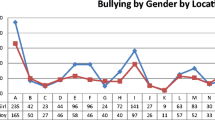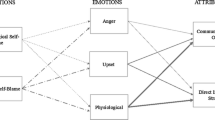Abstract
Using a retrospective approach, this study explored psychological maltreatment by teachers of students from kindergarten through the 12th grade. Participants were 453 undergraduates who completed a survey about their negative experiences with teachers. Overall, 44 % of those surveyed reported at least one experience that they labeled as emotional abuse, and 52 % reported that a teacher had bullied them. The most commonly reported negative teacher behaviors included being shouted at and being given a lower grade than deserved. Although adaptive responses were reported, serious negative responses were reported, too. Many perceived these experiences as having an adverse effect on their life. Despite the frequency of negative teacher behaviors that were reported, relatively few participants (<20 %) acknowledged receiving education on teacher bullying.
Similar content being viewed by others
Notes
When citing the work of other researchers, we have generally used their terminology.
References
American Professional Society on the Abuse of Children. (1995). Guidelines for psychosocial evaluation of suspected psychological maltreatment in children and adolescents. Chicago: Author.
Baker, A. J. L. (2009). Adult recall of childhood psychological maltreatment: definitional strategies and challenges. Children and Youth Services Review, 31, 703–714. doi:10.1016/j.childyouth.2009.03.001.
Ba-Saddik, A. S. S., & Hattab, A. S. (2012). Emotional abuse towards children by schoolteachers in Aden governorate, Yemen: a cross-sectional study. BMC Public Health, 12, 647. doi:10.1186/1471-2458-12-647.
Benbenishty, R., Zeira, A., & Astor, R. A. (2002). Children’s reports of emotional, physical and sexual maltreatment by educational staff in Israel. Child Abuse & Neglect, 26, 763–782. doi:10.1016/S0145-2134(02)00350-2.
Brendgen, M., Wanner, B., & Vitaro, F. (2006). Verbal abuse by the teacher and child adjustment from kindergarten through grade 6. Pediatrics, 117(1585–1598), 2005–2050. doi:10.1542/peds.
Brendgen, M., Wanner, B., Vitaro, F., Bukowski, W. M., & Tremblay, R. E. (2007). Verbal abuse by the teacher during childhood and academic, behavioral, and emotional adjustment in young adulthood. Journal of Educational Psychology, 99, 26–38. doi:10.1037/0022-0663.99.1.26.
Cornell, D., Gregory, A., Huang, F., & Fan, X. (2013). Perceived prevalence of teasing and bullying predicts high school dropout rates. Journal of Educational Psychology, 105, 138–149. doi:10.1037/a0030416.
Delfabbro, P., Winefield, T., Trainor, S., Dollard, M., Anderson, S., Metzer, J., & Hammarstrom, A. (2006). Peer and teacher bullying/victimization of South Australian secondary school students: Prevalence and psychosocial profiles. British Journal of Educational Psychology, 76, 71–90. doi:10.1348/000709904X24645.
Doumen, S., Verschueren, K., Buyse, E., Germeijs, V., & Luyckx, K. (2008). Reciprocal relations between teacher-child conflict and aggressive behavior in kindergarten: a three-wave longitudinal study. Journal of Clinical Child & Adolescent Psychology, 37, 588–599. doi:10.1080/15374410802148079.
Emery, R. E., & Laumann-Billings, L. (2002). Child abuse. In M. Rutter & E. Taylor (Eds.), Child and adolescent psychiatry (4th ed., pp. 325–339). Oxford: Blackwell Science.
Friedman, R. J., & Chase-Lansdale, P. L. (2002). Chronic adversities. In M. Rutter & E. Taylor (Eds.), Child and adolescent psychiatry (4th ed., pp. 261–276). Oxford: Blackwell Science.
Hamre, B. K., & Pianta, R. C. (2001). Early teacher-child relationships and the trajectory of children’s school outcomes through eighth grade. Child Development, 72, 625–638. doi:10.1111/1467-8624.00301.
Hart, S. N., & Brassard, M. R. (1987). A major threat to children’s mental health: Psychological maltreatment. American Psychologist, 42, 160–165.
Hyman, I. A., & Snook, P. A. (1999). Psychological maltreatment in the classroom. In Dangerous schools: what we can do about the physical and emotional abuse of our children (pp. 52–77). San Francisco: Jossey-Bass.
James, D. J., Lawlor, M., Courtney, P., Flynn, A., Henry, B., & Murphy, N. (2008). Bullying behaviour in secondary schools: what roles do teachers play? Child Abuse Review, 17, 160–173. doi:10.1002/car.1025.
Kettrey, H. H., & Emery, B. C. (2006). The discourse of sibling violence. Journal of Family Violence, 21, 407–416. doi:10.1007/s10896-006-9036-0.
Khoury-Kassabri, M. (2012). The relationship between teacher self-efficacy and violence toward students as mediated by teacher’s attitude. Social Work Research, 36(2), 127–139. doi:10.1093/swr/svs004.
Khoury-Kassabri, M., Astor, R. A., & Benbenishty, R. (2008). Student victimization by school staff in the context of an Israeli national school safety campaign. Aggressive Behavior, 34, 1–8. doi:10.1002/ab.20180.
King, M. A., & Janson, G. R. (2011). Beware emotional maltreatment. Principal, 91(1), 18–21. Retrieved from http://www.naesp.org/principal.
McEvoy, A. (2005). Teachers who bully students: Patterns and policy implications. Paper presented at the Hamilton fish. Philadelphia: Institute’s Persistently Safe Schools Conference.
Monsvold, T., Bendixen, M., Hagen, R., & Helvik, A.-S. (2011). Exposure to teacher bullying in schools: a study of patients with personality disorders. Nordic Journal of Psychiatry, 65, 323–329. doi:10.3109/08039488.2010.546881.
Mullet, J. H. (2006). The bully within us … as teachers. Academic Exchange Quarterly, 10(3), 95–99.
Nesbit, W. C., & Philpott, D. F. (2002). Confronting subtle emotional abuse in classrooms. Guidance & Counseling, 17, 32–39.
Pottinger, A. M., & Stair, A. G. (2009). Bullying of students by teachers and peers and its effect on the psychological well-being of students in Jamaican schools. Journal of School Violence, 8, 312–327. doi:10.1080/15388220903130155.
Roorda, D. L., Koomen, H. M. Y., Split, J. L., & Oort, F. J. (2011). The influence of affective teacher-student relationships on students’ school engagement and achievement: a meta-analytic approach. Review of Educational Research, 81, 493–529. doi: 10.3102/0034654311421793.
Rudasill, K. M., Reio, T. G., Jr., Stipanovic, N., & Taylor, J. E. (2010). A longitudinal study of student-teacher relationship quality, difficult temperament, and risky behavior from childhood to early adolescence. Journal of School Psychology, 48, 389–412. doi:10.1016/j.jsp.2010.05.001.
Santinello, M., Vieno, A., & De Vogli, R. (2011). Bullying in Italian schools: the role of perceived teacher unfairness. European Journal of Psychology of Education, 26, 235–246. doi:10.1007/s10212-010-0050-5.
Sheikhattari, P., Stephenson, R., Assasi, N., Eftekhar, H., Zamani, Q., Maleki, B., & Kiabayan, H. (2006). Child maltreatment among school children in the Kurdistan province, Iran. Child Abuse & Neglect, 30, 231–245. doi:10.1016/j.chiabu.2005.10.009.
Shumba, A. (2002). The nature, extent and effects of emotional abuse on primary school pupils by teachers in Zimbabwe. Child Abuse & Neglect, 26, 783–791. doi:10.1016/S0145-2134 (02)00351-4.
Shumba, A. (2004). Emotional abuse in the classroom: a cultural dilemma? Journal of Emotional Abuse, 4(3/4), 139–149. doi:10.1300/J135v04n03_09.
Terry, M. L., & Baer, A. M. (2012). Bully teachers. American School Board Journal, 199(12), 24–25. Retrieved from www.asbj.com.
Theoklitou, D., Kabitsis, N., & Kabitsi, A. (2012). Physical and emotional abuse of primary school children by teachers. Child Abuse & Neglect, 36, 64–70. doi:10.1016/j.chiabu.2011.05.007.
Timmerman, G. (2003). Sexual harassment of adolescents perpetrated by teachers and by peers: an exploration of the dynamics of power, culture, and gender in secondary schools. Sex Roles, 48, 231–244. doi:10.1023/A:1022821320739.
Twemlow, S. W., & Fonagy, P. (2005). The prevalence of teachers who bully students in schools with differing levels of behavioral problems. American Journal of Psychiatry, 162, 2387–2389. doi:10.1176/appi.ajp.162.12.2387.
Twemlow, S. W., Fonagy, P., Sacco, F. C., & Brethour, J. R., Jr. (2006). Teachers who bully students: a hidden trauma. International Journal of Social Psychiatry, 52, 187–198. doi:10.1177/0020764006067234.
Whitted, K. S., & Dupper, D. R. (2008). Do teachers bully students?: findings from a survey of students in an alternative education setting. Education and Urban Society, 40, 329–341. doi:10.1177/0013124507304487.
Zerillo, C., & Osterman, K. F. (2011). Teacher perceptions of teacher bullying. Improving Schools, 14, 239–257. doi:10.1177/1365480211419586.
Author information
Authors and Affiliations
Corresponding author
Rights and permissions
About this article
Cite this article
Fromuth, M.E., Davis, T.L., Kelly, D.B. et al. Descriptive Features of Student Psychological Maltreatment by Teachers. Journ Child Adol Trauma 8, 127–135 (2015). https://doi.org/10.1007/s40653-015-0042-3
Published:
Issue Date:
DOI: https://doi.org/10.1007/s40653-015-0042-3




